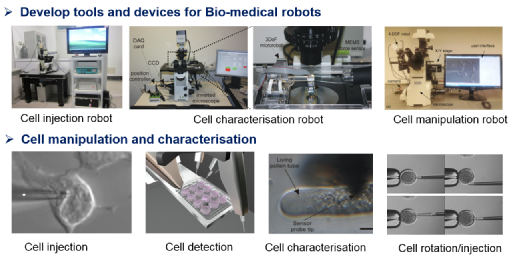Work Packages
This project has been divided into six inter-related work packages (WPs) which will be investigated by the consortium step by step. Each work package has one lead organisation and several participant institutes.
The high quality infrastructure and strong background of the consortium will further strengthen the capability to achieve the ultimate goal. The inter-disciplinary cooperation character of the EU and Chinese organisations and strong international collaborations are advantageous for successful establishment of the key enabling technique to benefit the niche areas of micro/nano robotics, single cell measurement and characterisation and their applications.
All the partners will contribute to the related research work packages briefly described below:
WP1 Project management:
This work package concerns all the management aspects of the project and monitoring of progress towards the ultimate objectives, identifying shortcomings and recommending remedial action where necessary. The coordinator will oversee action plans and monitor their timely execution, within the given resources. All IPR issues will be dealt with carefully. The consortium members will meet every six months to report project progress. Regular joint workshops and seminars with the attendance of all beneficiaries/partner organisations will be convened every 12 months. During these workshops and seminars, attendees will share the experience and knowledge occurred in the joint research and training activities. Besides the regular consortium workshops and seminars, irregular workshops and seminars will be organised in both EU and China for the local exchanged staff. This work package will be led by UoW.
WP2 Knowledge base setup and road mapping:
This work package focuses on the analysis of individual user needs and demands for design, fabrication and control technologies of micro/nano robotics for single cell biology, and evaluates and assesses various relevant methodologies. A systematic review and interviews with selected users from various industrial/clinical sectors will be conducted and a knowledge base of end-users and their requirements will be setup subsequently. The survey and review will result in recommendations for new methodologies for MNR4SCell. Based on the analysis of the individual user needs, a knowledge base will be built for further exploitation. The beneficiaries/partner organisations involved in this WP have their experience and knowledge in development of micro/nano robotic system and their potential applications in single cancer cell manipulation and measurement. The majority of the work on this WP will be done in the host organizations. This work package will be led by UOL.
WP3 Fundamental exploration of micro/nano robotics:
This workpackage will conduct the work on three main tasks including (1) sensing and actuation used for high-speed biological cell detection, low force measurement and calibration, micro-fluidic feeding and handling, nano handling, holographic reconstruction and 3D vision, nonlinear SIM, high-precision positioning and visual servoing, (2) micro and nano handling using patch-clamp pipettes, microfluidic devices, microgrippers and optical/magnetic tweezers for biomedical applications, and (3) human-robot interaction for fundamental exploration of nano manipulation and measurement robotics. This work package will be led by ETH.
WP4 Micro/nano robotic systems:
This work package focuses on the development of micro/nano robotics for the single cell handling, measurement and characterisation using the established fundamental knowledge. The versatile micro/nano robot with multi-axis cellular force sensors will be developed for the quantitative measurement of single cell, and the haptic enabled motion and handling technique will be utilized for the micro/nano manipulation for single cells. A dual-probe AFM-based nanorobotic system will be developed for the mechanical, electrical and temperature sensing, and the dual-probe AFM-based nano robot can also be used to measure the electrical properties of cells. The mechanical holography and dynamic mechanical spectroscopy will be developed for the imaging nanoparticles inside cells. A 3D magnetic biomanipulation robotic system will be established to for the cancer cells therapy. This workpackage will be led by UoW.
WP5 Manipulation and measurement of single cancer cells: This work package investigates the measurement and manipulation of single cancer cells using the developed unique micro/nano robotics and explore their behaviours for different drugs and treatments. The mechanical, electrical and physical properties of the single cancer cells before and after treatment with different medicines will be examined for the phenotype, diagnosis and therapy of cancer. The mechanical properties of cell will be measured and the intracellular influences on the mechanical measurement will also be explored for further insight the properties of the cells. The membrane potentials at chosen positions will be measured by intracellular electrophysiological recording robots. The voltage gated ion channels of a cell and the cell responses to the current stimulation will be recorded and studied using the dual-probe AFM-based robotic systems with nano-electrode arrays. Bothe the cell injection and the magnetic particles with surface functionalization will be used for single cancer cell surgery and therapy. This workpackage will be led by AU.
WP6 Dissemination and technical transfer:
This work focuses on the dissemination and exploitation of the project results. The dissemination will be implemented through the following activities: MNR4SCell public events/workshops and publications including patents, journal & conference papers, reports and the media releases. Each partner will have at least one publication on average each year, giving more than 32 publications in total. The consortium targets 3 patent applications during the project period. WP6 will be led by UoN
